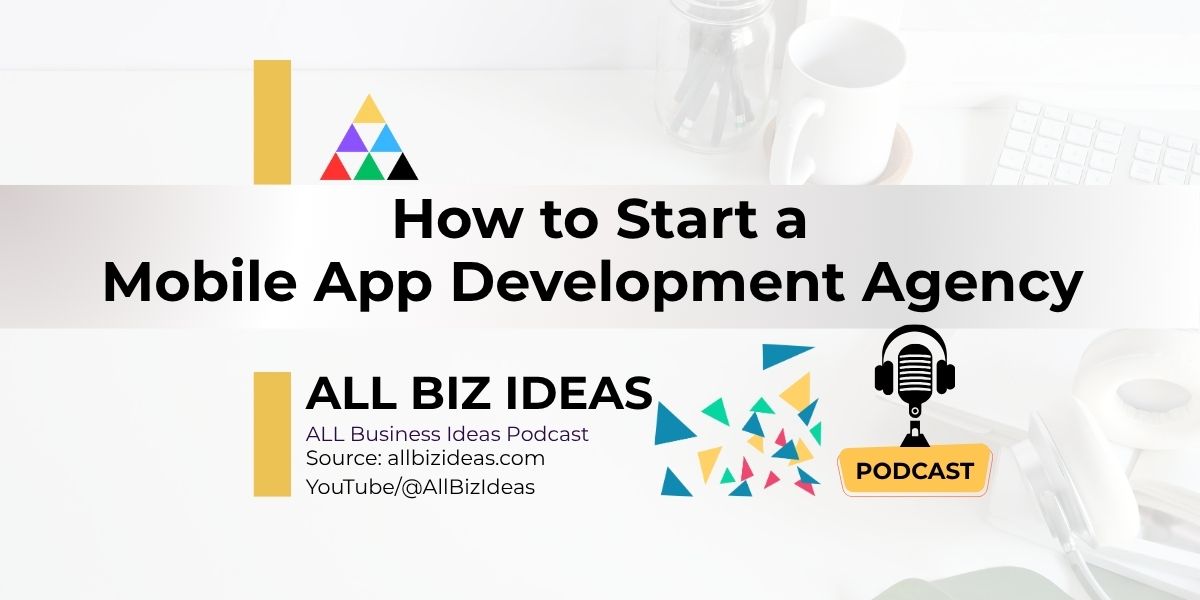Mobile App Development Agency Business (No Code Low Code): The Ultimate In-Depth Guide to Starting, Scaling, and Succeeding
The mobile app development agency business (no code low code) is transforming how digital products are built. No longer is mobile app creation the exclusive domain of seasoned software engineers. Today, entrepreneurs, freelancers, and small businesses are leveraging no-code and low-code platforms to quickly launch mobile apps that solve real-world problems—without needing to write or maintain traditional code.
In this in-depth guide, you’ll learn what the mobile app development agency business (no code low code) is all about, why now is the best time to enter the space, and how you can start your own profitable venture step-by-step. You’ll also discover the best tools, strategies, niches, and SEO tactics to help you rank and grow in this digital services industry.
Frequently Asked Questions
1. What is a "no-code/low-code" mobile app development agency business?
A no-code/low-code mobile app development agency business focuses on creating and deploying mobile applications using visual development platforms instead of traditional coding. These platforms allow individuals with minimal or no programming experience to build complex apps by using drag-and-drop functionalities, integrating databases, and connecting APIs.
No-code tools like Adalo, Thunkable, and Glide offer full app creation with visual interfaces, while low-code platforms such as FlutterFlow, OutSystems, and Microsoft Power Apps provide more customization for users with some basic coding knowledge. This approach significantly reduces the time and cost associated with app development, making technology more accessible.
2. Why is now a good time to start a no-code/low-code mobile app development agency?
Several factors make the current climate ideal for starting a no-code/low-code mobile app development agency. The global mobile app market is projected to reach over $935 billion by 2026, indicating a massive demand, especially from small businesses, creators, and service providers who need tailored apps but cannot afford traditional custom development.
No-code/low-code solutions offer unparalleled speed and affordability, allowing apps to go from idea to launch in days instead of months, reducing costs by 70-90%. This democratizes tech access, enabling non-developers to compete effectively.
Furthermore, the business model is versatile, allowing for app development services, template sales, SaaS product creation, or even internal tool development for enterprises.
3. What essential skills are needed to succeed in this business, beyond just knowing the tools?
While no-code doesn’t mean “no knowledge,” a successful mobile app development agency requires a range of essential skills beyond mere tool proficiency. These include User Experience (UX) Design, which focuses on creating intuitive and enjoyable app interfaces, and Visual Development, understanding how to effectively use the visual platforms.
Additionally, knowledge of API Integration and Database Structure is crucial for connecting various services and managing data efficiently. Automation Workflows are important for streamlining processes, and strong Client Communication skills are vital for understanding client needs and managing expectations. Learning resources include platforms like Zeroqode Lab, Makerpad, Udemy, and various YouTube channels.
4. How can a new no-code/low-code app development agency gain a competitive advantage?
To stand out in the growing no-code/low-code app development market, an agency should implement several strategies. Niche down by specializing in a specific industry (e.g., “Apps for Fitness Instructors” or “Custom CRM Apps for Local Contractors”) to become the go-to expert for that group. Offer done-for-you services that go beyond just building the app, including design, testing, onboarding, and post-launch support.
Leverage AI tools like ChatGPT for content and UX copy, and Midjourney/DALL-E for design assets to build faster and more efficiently. Create reusable templates to reduce development time and offer them for sale or as a basis for customization. Finally, bundle services (e.g., “app + landing page + email funnel”) to provide comprehensive solutions and increase client value.
5. What are the typical startup costs for a no-code/low-code mobile app development agency?
One of the significant advantages of this business model is its minimal upfront capital requirement. Estimated monthly costs for a lean startup model range from $30–$100, while estimated one-time costs are typically $100–$300, leading to a total professional startup cost of under $500. This breakdown includes:
- No-Code Platform Subscription: $0–$50/month per tool (many offer free tiers, paid plans for custom domains/features).
- Domain Name & Hosting: $10–$20/year (for domain) and ~$10/month (for hosting on platforms like Webflow, Durable, Framer, or Hostinger).
- Design Tools: Free–$15/month (e.g., Figma free tier, Canva Pro).
- Email Marketing: Free–$25/month (e.g., Mailchimp, ConvertKit).
- Legal Setup: $50–$300 one-time (for business registration like LLC or sole proprietorship).
- Marketing/Ads: Optional $50–$200/month (initially focus on organic growth).
- Education & Training: Free–$200 one-time (for courses on platforms like Udemy, Makerpad).
6. What marketing channels and strategies are effective for attracting clients?
An effective marketing plan targets the right audience, uses low-cost acquisition channels, and highlights unique value. Key strategies and channels include:
- Content Marketing (SEO): Blogging about “how to build X app without coding” and optimizing for relevant keywords using tools like Semrush.
- LinkedIn Outreach: Directly messaging local business owners or consultants with tailored app ideas.
- Cold Emailing: Reaching out to niche businesses with personalized video demos using tools like Loom and Hunter.io.
- Local Business Listings: Posting services on platforms like Thumbtack, Bark, or local Facebook groups.
- Freelance Platforms: Listing services on Upwork, Fiverr, or Contra.
- Social Media (YouTube Shorts/Instagram Reels): Creating short app demos with clear calls-to-action. Target audiences include local service providers, coaches/course creators, real estate agents, and nonprofits, all of whom can benefit from customized, affordable app solutions.
7. What are the various monetization strategies for a no-code/low-code app development agency?
Beyond just building apps for clients, there are several ways to generate revenue and build recurring income in this business:
- Client Services: This is the core model, building custom apps for others on a freelance or agency basis.
- Template Sales: Creating and selling pre-built, customizable app templates on marketplaces like Zeroqode.
- SaaS Products: Developing and launching your own Software as a Service (SaaS) applications that generate recurring revenue through subscriptions.
- Courses & Coaching: Leveraging your expertise to teach others how to use no-code/low-code tools and build their own apps. This allows for diversified income streams and greater business stability.
8. How can AI tools be integrated to enhance the mobile app development process?
AI tools can significantly streamline workflows, reduce development time, and improve app quality.
- ChatGPT: Can be used to generate UX copy, develop complex workflows, or explain logic, speeding up content creation and technical understanding.
- Midjourney / DALL·E: Ideal for creating high-quality app icons, hero images, and other branded visual assets quickly and efficiently.
- Durable.co: Offers AI-generated websites in minutes, useful for quickly establishing an agency’s online presence.
- Tally.so: Provides simple forms for user sign-ups and lead capture, streamlining initial client interactions.
- Zapier / Make.com: Essential for automating user actions and various app processes, connecting different tools and platforms seamlessly.
- Xano / Supabase: Act as no-code/low-code backend solutions, providing robust API capabilities and database management without extensive coding, accelerating server-side development.
What is the Mobile App Development Agency Business (No Code Low Code)?
The mobile app development agency business (no code low code) involves building and deploying mobile applications using visual development platforms. These tools enable users to create complex workflows, integrate databases, connect APIs, and design custom interfaces—all without advanced programming knowledge.
- No-Code Platforms: Tools like Adalo, Thunkable, and Glide allow full app creation with drag-and-drop functionality.
- Low-Code Platforms: Tools like FlutterFlow, OutSystems, and Microsoft Power Apps provide more customization for users with minimal coding experience.
Why Start a Mobile App Development Agency Business (No Code Low Code)?
Starting a mobile app development agency business (no code low code) presents a unique opportunity for digital entrepreneurs. Here’s why:
Market Demand Is Surging
- The global mobile app market is projected to exceed $935 billion by 2026. Small businesses, creators, and service providers increasingly need tailored apps but can’t afford custom development.
Speed & Affordability
- You can go from idea to app in days instead of months, reducing costs by 70–90% compared to traditional software development.
Democratized Tech Access
- Non-developers can now compete in the tech arena using no-code platforms. This levels the playing field for entrepreneurs and creators worldwide.
Versatile Business Models
- Offer app development services, sell templates, launch your own SaaS apps, or create internal tools for enterprises.
Step-by-Step Guide: How to Start a Mobile App Development Agency Business (No Code Low Code)
This section provides a thorough breakdown of how to launch and grow your own mobile app development business (no code low code) from scratch.
Step 1: Research & Understand the Ecosystem
Before you build, study the no-code low-code landscape. Focus on understanding:
- Types of apps you can create (marketplace, SaaS, CRM, event planning, etc.)
- Target industries and their common pain points
- Strengths and limitations of platforms
Action Step: Read platform documentation and watch YouTube walkthroughs (start with Bubble, Adalo, Thunkable, FlutterFlow, Glide).
Step 2: Choose Your Niche Strategically
Choosing the right niche is critical for success. Avoid generic or oversaturated markets and focus on high-need, under-served industries.
Saturated Niches:
- Food delivery
- Generic fitness trackers
- Social media clones
- Basic task apps
Underserved Niches:
- Local service providers (cleaners, plumbers, pet sitters)
- Niche education apps (language tutors, exam prep)
- Industry-specific tools (e.g., inventory for auto shops)
- Mental health & wellness journaling apps
- Religious and cultural community platforms
Action Step: Use Google Trends and platforms like Exploding Topics to validate demand.
Step 3: Select Your No-Code/Low-Code Tools
Pick platforms based on your niche, app complexity, and device focus.
Tool | Best For | Features |
Adalo | Simple mobile apps | Database, logic, native deployment |
Bubble | Complex web apps | Full backend logic, responsive design |
FlutterFlow | Low-code mobile apps | Built on Flutter, Firebase integration |
Thunkable | Cross-platform apps | Component-based builder, logic blocks |
Glide | Spreadsheet-powered apps | Easy to build MVPs from Airtable/Sheets |
Action Step: Create a free account on each and test a basic app.
Step 4: Learn Core Skills (No Code Doesn’t Mean No Knowledge)
To run a successful mobile app development agency business (no code low code), you need more than tools—you need skills.
Essential Skills:
- User Experience (UX) Design
- Visual Development
- API Integration
- Database Structure
- Automation Workflows
- Client Communication
How to Learn:
- Zeroqode Lab – Advanced Bubble tutorials
- Makerpad – Community and project-based learning
- Udemy – Adalo, Glide, and FlutterFlow courses
- YouTube – Channels like NoCodeDevs and BuildCamp
Step 5: Build Your Portfolio
Build 2–3 apps that showcase your range and problem-solving ability. Examples:
- Appointment booking for pet groomers
- Local handyman request app
- Sales tracking dashboard for realtors
Action Step: Create case studies showing what problem your app solves and how it works.
Step 6: Set Up Your Business Foundation
Treat this as a real business, not just a side hustle.
- Name & Branding: Pick a name, buy a domain, build a simple landing page on Webflow or Durable.co.
- Legal Structure: Register your business (LLC or sole proprietorship).
- Pricing Strategy: Offer tiered packages (MVP, full app, ongoing support).
- Proposal Templates: Use Bonsai or Notion for contracts and quotes.
Step 7: Market Your Services
To grow your mobile app development agency business (no code low code), you must consistently attract leads.
Marketing Channels:
- Freelance Marketplaces: Upwork, Fiverr, Toptal
- Cold Outreach: Email small businesses with custom app suggestions
- SEO Blogging: Write SEO-optimized content targeting keywords like:
- “no-code app for yoga instructors”
- “how to build a salon booking app without coding”
- Social Media & LinkedIn: Showcase projects, offer tips
Step 8: Monetization Strategies
There are several ways to generate recurring revenue:
- Client Services: Build apps for others (freelance or agency model)
- Template Sales: Sell pre-built apps on marketplaces like Zeroqode
- SaaS Products: Create your own recurring revenue apps
- Courses & Coaching: Teach others how to use tools
Best AI Tools & Resources for App Builders
AI can drastically reduce your development time, streamline workflows, and improve app quality.
AI Platforms
- ChatGPT – Generate UX copy, workflows, or logic explanations
- Midjourney / DALL·E – Create app icons, hero images
- Durable.co – Build AI-generated websites in minutes
- Tally.so – Forms for user sign-ups and lead capture
Automation & Backend
- Zapier / Make.com – Automate user actions and processes
- Xano – No-code backend with API capabilities
- Supabase – Low-code Firebase alternative
SEO Tips to Grow Your Mobile App Development Agency Business (No Code Low Code)
- Use keyword variations like:
- “build mobile apps without coding”
- “no code app developer for small business”
- “how to start a low code app business”
- Create SEO-focused content:
- App walkthroughs
- Case studies with search-optimized titles
- “How to build an app for [industry] without code”
- Use tools like Ahrefs, Semrush, or Surfer SEO to find low-competition keywords.
Cost Breakdown to Start a Mobile App Development Agency Business (No Code Low Code)
One of the greatest advantages of the mobile app development agency business (no code low code) is that it requires minimal upfront capital. Here’s a realistic budget breakdown to get started:
Item | Cost | Description |
No-Code Platform Subscription | $0–$50/month per tool | Most tools like Adalo, Thunkable, and Bubble offer free plans; paid plans unlock custom domains and more features. |
Domain Name & Hosting | $10–$20/year | Use providers like Hostinger, Google Domains. Hosting with platforms like Webflow, Durable, Framer or Hostinger can be ~$10/month. |
Design Tools | Free–$15/month | Figma (free tier is generous); Canva Pro for branding or icons. |
Email Marketing | Free–$25/month | Mailchimp, ConvertKit, or Brevo for managing client emails. |
Legal Setup | $50–$300 (one-time) | Depending on your country/state, cost to register an LLC or sole proprietorship. |
Marketing/Ads | Optional: $50–$200/month | Use sparingly at first; focus on organic traffic. |
Education & Training | Free–$200 one-time | Courses on Udemy, Makerpad, Zeroqode Lab. |
- Estimated Monthly Costs (lean startup model): $30–$100/month
- Estimated One-Time Costs: $100–$300
- Total to get started professionally: Under $500
Marketing Plan for a Mobile App Development Agency (No Code Low Code)
An effective marketing strategy must target the right audience, use low-cost acquisition channels, and highlight unique value. Here’s a step-by-step plan.
Target Audience
Segment your market based on your niche. Examples include:
- Local Service Providers: Small businesses that need appointment booking, CRM, or loyalty apps.
- Coaches & Course Creators: Need membership or e-learning apps.
- Real Estate Agents: Need mobile tools for client listings and lead tracking.
- Nonprofits or Religious Communities: Often need low-budget, easy-to-maintain mobile apps.
Marketing Channels & Strategies
Channel | Strategy | Tools |
Content Marketing (SEO) | Blog about “how to build X app without coding” | WordPress, Webflow, Semrush |
LinkedIn Outreach | DM local business owners or consultants with a tailored app idea | LinkedIn Sales Navigator |
Cold Emailing | Reach out to niche businesses with personalized video demos | Loom, Hunter.io |
Local Business Listings | Post services on Thumbtack, Bark, or local FB groups | Free |
Freelance Platforms | List services on Upwork, Fiverr, Contra | Free (commission-based) |
YouTube Shorts/Instagram Reels | 30-second app demos with calls-to-action | Canva, CapCut |
Sample Outreach Email (for Coaches)
Subject: Custom Mobile App for Your Coaching Brand
Hi [Name],
I noticed you run [Business Name] and thought you’d benefit from a custom app where clients can book sessions, access content, and message you—all on their phones.
I specialize in building apps like this using modern no-code platforms—meaning lower cost and faster delivery. Want to see a quick demo?
Best,
[Your Name]
[Website/Portfolio]
Who Are Your Competitors (And How to Beat Them)?
While the mobile app development agency (no code low code) is growing, most competitors fall into three categories:
- No-Code Freelancers & Agencies
- Often specialize in platforms like Bubble or Adalo.
- Usually broad in focus (e.g., “I build all types of apps”).
Examples:
- Minimum Studio – Bubble app agency
- Idea Link – Glide and Bubble specialists
- Various creators on Fiverr and Upwork
- DIY Platforms (B2C SaaS)
- Glide, Adalo, AppGyver offer templates but require users to build themselves.
Gap: Many small business owners don’t have time or skills, even with no-code tools.
How to Gain Competitive Advantage
To stand out in the mobile app development agency business (no code low code):
Niche Down
- Focus on a specific industry and become “the app guy/girl” for that group.
- E.g., “Apps for Fitness Instructors” or “Custom CRM Apps for Local Contractors.”
Offer Done-For-You Services
- Don’t just sell tools—sell outcomes.
- Include app design, testing, onboarding, and post-launch support.
Use AI to Build Faster
- Use ChatGPT to create content, UX copy, and documentation.
- Use AI image tools to design branded assets quickly.
Create Templates
- Build reusable templates to reduce dev time and upsell licensing or customization services.
Bundle Services
- Offer “app + landing page + email funnel” as a package.
- Bundle backend (Airtable/Xano) + mobile front-end.
Key Differentiators You Can Leverage on Your Mobile App Development Agency Business
Advantage | Description |
Speed | Deliver in days, not weeks. |
Affordability | Charge $500–$2,000 for MVPs (vs. $10K+ custom builds). |
Industry Insight | Speak their language (e.g., real estate, fitness, coaching). |
Support & Updates | Offer monthly retainer for app updates or improvements. |
Conclusion
The mobile app development agency business (no code low code) is one of the most accessible and scalable opportunities in today’s digital economy. Whether you’re a solopreneur looking to generate freelance income or an aspiring tech founder wanting to build SaaS apps, no-code/low-code tools give you the leverage to bring your vision to life—faster and cheaper than ever before.
Success in this space comes from picking the right niche, continuously improving your skills, and solving real problems. With the right tools, AI resources, and a clear business strategy, you can build a thriving business with minimal startup capital and massive growth potential.
Starting a mobile app development agency business (no code low code) is one of the most accessible, profitable, and future-proof digital ventures today. With the right strategy, tools, and positioning, you can build a scalable business without deep coding expertise.
By focusing on underserved niches, using smart marketing, and leveraging AI and automation, you can offer immense value while maintaining a lean and agile operation.



